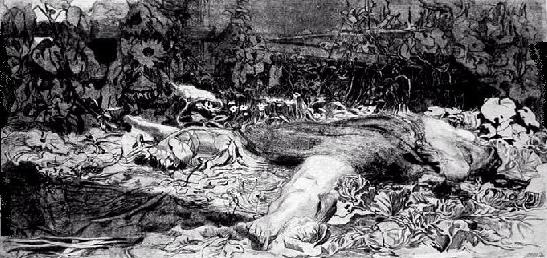
In der dunklen Nacht,
Wenn vor uns stehen,
Die immer neu unserem Herzen fehlen,
Erinnrung erwacht
An die alten Kirchen, die Hügel im Feld,
Wo sie schlafen, Vätern und Nachbarn gesellt,
In verlorener Heimat über der See,
Und an alle, die hilflos und einsam starben,
An alle, die sinkend im Eis verdarben,
die keiner begrub, nur Wasser und Schnee,
Auf dem Weg unsrer Flucht, – dem Weg ohne Gnade!
Und wir ziehen im Traum verwehte Pfade
Wagen an Wagen, endloser Zug
Der ein Volk von der Heimat trug!
Von Norden, von Osten kamen wir,
Über Heide und Ströme zogen wir,
Nach Westen wandernd, Greis, Frau und Kind.
Wir kamen gegangen, wir kamen gefahren,
Mit Schlitten und Bündel, mit Hund und Karren,
Gepeitscht vom Wind, vom Schneelicht blind,
Und Wagen an Wagen.
Zuckend wie Nordlicht am Himmel stand
Verlassner Dörfer und Städte Brand.
Und um uns heulte und pfiff der Tod,
Auf glühendem Ball durch die Luft getragen.
Und der Schnee wurde rot.
Und es sanken wie Garben, die hilflos starben.
Und wir zogen weiter,
Wagen an Wagen,
Und kamen noch einmal, trügrisches Hoffen,
Durch friedliches Land.
Tür stand uns offen
Bei jenen, die nicht unser Leiden gekannt.
Sie kamen, sie winkten, sie reichten uns Brot,
Sie luden die Not
Am warmen Herde zu sich als Gast.
Scheune und Stroh rief Müde zur Rast.
Doch wir konnten nicht bleiben.
Wir zogen vorüber,
Wagen an Wagen.
Und hörten durch Sturm und Flockentreiben
Das Glockenlied ihrer Türme noch
Und hörten doch
Das Dröhnen des Krieges, der hinter uns zog.
Und vom Wegkreuz bog,
Blutend, mit ausgebreiteten Armen,
Sich dorngekrönter Liebe Erbarmen.
Wir konnten nicht halten, wir konnten nicht knien.
Sie kamen hinter uns, Wagen an Wagen,
Unsre Herzen nur schrien:
O blick nach uns hin!
Wir wandern, wir wandern, endloser Zug,
Volk, das die Geißel des Krieges schlug,
Entwurzelter Wald, von der Flut getragen,
Wohin?
Wohin?

